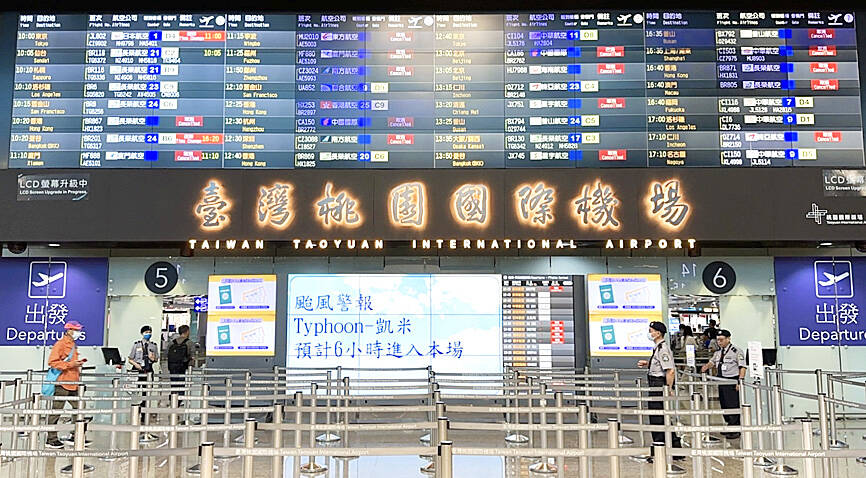A Chinese family of three who were seeking political asylum in Taiwan have been redirected to another country that could provide them with the safety they were pursuing, the National Immigration Agency’s Border Affairs Corps said on Thursday.
The family includes a woman, with the name Deng Liting (鄧麗婷) on her Chinese passport, and has a popular following on the social media platform X, the corps told the Central News Agency.
Deng and her family recently entered Taiwan as transit passengers, and upon arrival made a request to be redirected to a Western country. They also asked about Taiwan’s political asylum laws and their prospects for staying in Taiwan, the corps said.

Photo: Tony Yao, Taipei Times
However, the three family members were unable to board a transfer flight to a Western country, as they did not have the required visas, the corps said.
As Taiwan has no laws to protect asylum seekers or regulations governing the handling of refugees, the corps arranged for the family to be redirected to another country, with their consent, it said.
In that undisclosed country, the family would have a chance to obtain the safety they are seeking, the corps added.
Taiwan’s handling of the matter did not contravene the UN’s Convention Relating to the Status of Refugees or its principle of non-refoulement, the corp said.
Meanwhile, Deng posted on X about her family’s efforts to seek asylum, saying on Tuesday that they had landed safely in Taiwan.
In an X post, she apologized to the Taiwanese public for creating a difficult situation.
Deng said she and her family had decided to take their chances in Taiwan, although they were aware that its laws do not cover refugees seeking political asylum.
After the family fled China, they went to Thailand and then to Singapore, seeking asylum, but to no avail, Deng said, adding that they had no choice but to try Taiwan next.
Deng said she has been persecuted in China and was at risk of severe punishment, which could have collaterally involved her young son.
Deng on Thursday posted on X that before her family arrived in Taiwan, they had applied for political asylum in Canada.
However, even with the help of the Ireland-based human rights organization Front Line Defenders, the asylum process could take six months to a year, she added.
She also said Taiwan has no obligation to her family and urged her followers not to hold Taiwan “hostage emotionally.”
The case of the Deng family was the third attempt in the past year by Chinese to seek political asylum in Taiwan.
A Chinese dissident, Chen Siming (陳思明), in September last year refused to return to China after his flight from Thailand made a transit stop in Taiwan.
He spent almost two weeks living in the transit area of Taiwan Taoyuan International Airport before he was eventually granted political asylum in Canada.
In February, three Chinese asylum seekers, who arrived in Taiwan from Malaysia, were sent back, as they could not present proper travel documents, such as visas and permits.

A strong continental cold air mass is to bring pollutants to Taiwan from tomorrow, the Ministry of Environment said today, as it issued an “orange” air quality alert for most of the country. All of Taiwan except for Hualien and Taitung counties is to be under an “orange” air quality alert tomorrow, indicating air quality that is unhealthy for sensitive groups. In China, areas from Shandong to Shanghai have been enveloped in haze since Saturday, the ministry said in a news release. Yesterday, hourly concentrations of PM2.5 in these areas ranged from 65 to 160 micrograms per cubic meter (mg/m³), and pollutants were

Taiwan’s armed forces have established response protocols for a wide range of sudden contingencies, including the “Wan Chun Plan” to protect the head of state, the Ministry of Defense (MND) said today. After US President Donald Trump on Saturday launched a series of airstrikes in Venezuela and kidnapped Venezuelan President Nicolas Maduro, concerns have been raised as to whether China would launch a similar “decapitation strike” on Taiwan. The armed forces regularly coordinate with relevant agencies and practice drills to ensure preparedness for a wide range of scenarios, Vice Minister of National Defense Hsu Szu-chien (徐斯儉) told reporters before a

EVA Airways on Saturday said that it had suspended a pilot and opened an investigation after he allegedly lost his temper and punched the first officer several times as their plane was taxiing before takeoff at Los Angeles International Airport. According to a report published on Thursday by The Reporter, the incident occurred after the flight’s Malaysian first officer tried to warn the Taiwanese pilot, surnamed Wen (文), that he was taxiing faster than the speed limit of 30 knots (55.6kph). After alerting the pilot several times without response, the first officer manually applied the brakes in accordance with standard operating

NOT AN OPENING: Trump’s violation of international law does not affect China’s consideration in attacking Taiwan; Beijing lacks capability, not precedent, an official said Taiwanese officials see the US’ capture of the president of Venezuela as a powerful deterrent to Beijing’s aggression and a timely reminder of the US’ ability to defeat militaries equipped with Chinese-made weapons. The strikes that toppled Venezuelan President Nicolas Maduro signaled to authoritarian leaders, including Chinese President Xi Jinping (習近平), US President Donald Trump’s willingness to use military might for international affairs core to US interests, one senior official in Taipei’s security circle said. That reassured Taiwan, the person said. Taipei has also dismissed the idea that Trump’s apparent violation of international law could embolden Beijing, said the official, who was not